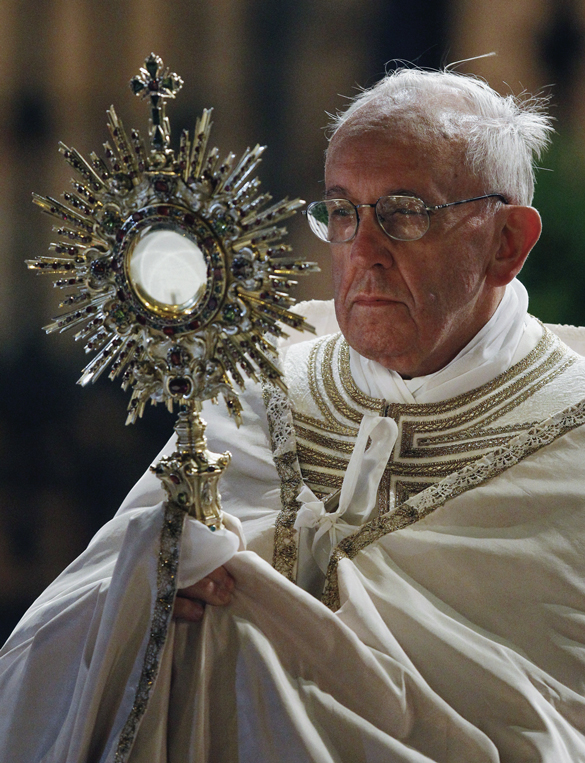Today we celebrate the institution of the Holy Eucharist and is marked by special displays of devotion to the Blessed Sacrament, most notably Eucharistic processions.
Pope Francis pointed to the many mothers and fathers who, “together with the slices of bread they provide each day on the tables of their homes, have broken their hearts to let their children grow, and grow well!”
He also commented how many Christians “as responsible citizens have broken their own lives to defend the dignity of all, especially the poorest, the marginalized and those discriminated against!”
“Where do they find the strength to do this? It is in the Eucharist: in the power of the Risen Lord’s love, who today too breaks bread for us and repeats: ‘Do this in remembrance of me.’”
The Pope called to mind the reading of St. Paul to the Corinthians recounting the institution of the Eucharist, He said, here is “the oldest testimony we have to the words of Christ at the Last Supper.”
By telling his disciples “do this,” Christ gives the command to repeat his own actions by which he gave us his own Body and Blood.
“Jesus gives the command to repeat this action by which he instituted the memorial of his own Pasch, and in so doing gives us his Body and his Blood. This action reaches us today: it is the 'doing' of the Eucharist which always has Jesus as its subject, but which is made real through our poor hands anointed by the Holy Spirit.”
In the today's Gospel passage from John, which recounted the miracle of the multiplication of the loaves and fish, Christ tells his disciples to “give them something to eat yourselves.” Christ is the one who blesses and breaks the bread, providing enough to feed the entire hungry crowd, it is the disciples who offer the loaves and fish.
“Jesus wanted it this way: that, instead of sending the crowd away, the disciples would put at his disposal what little they had.”
“Clearly this miracle was not intended merely to satisfy hunger for a day, but rather it signals what Christ wants to accomplish for the salvation of all mankind, giving his own flesh and blood. And yet this needs always to happen through those two small actions: offering the few loaves and fish we have; receiving the bread broken by the hands of Jesus and giving it to all.”
Pope Francis said the breaking of the bread signifies another meaning of Christ's command to “do this in remembrance of me” – allowing ourselves to make sacrifices and to be broken for the good of others.
He commented how “breaking bread” became a sign for recognizing Christ and Christians, and pointed to several passages in scripture recounting how the disciples broke bread together.
“From the outset it is the Eucharist which becomes the center and pattern of the life of the Church.”
Pope Francis concluded his homily thoughts by saying that the Eucharistic procession after Mass would be a response to Christ's command: “an action to commemorate him; an action to give food to the crowds of today; an act to break open our faith and our lives as a sign of Christ’s love for this city and for the whole world.”
Pope Francis said the breaking of the bread signifies another meaning of Christ's command to “do this in remembrance of me” – allowing ourselves to make sacrifices and to be broken for the good of others.
He commented how “breaking bread” became a sign for recognizing Christ and Christians, and pointed to several passages in scripture recounting how the disciples broke bread together.
“From the outset it is the Eucharist which becomes the center and pattern of the life of the Church.”
Pope Francis concluded his homily thoughts by saying that the Eucharistic procession after Mass would be a response to Christ's command: “an action to commemorate him; an action to give food to the crowds of today; an act to break open our faith and our lives as a sign of Christ’s love for this city and for the whole world.”

